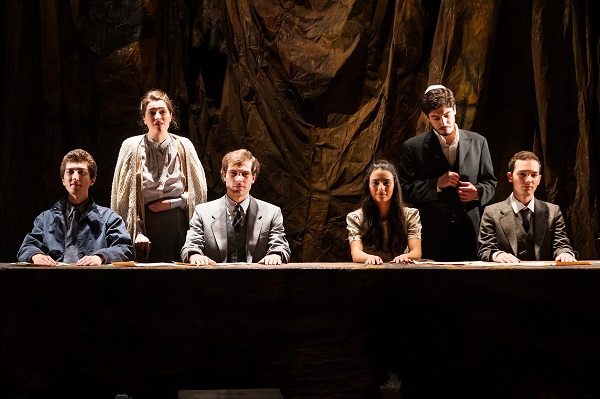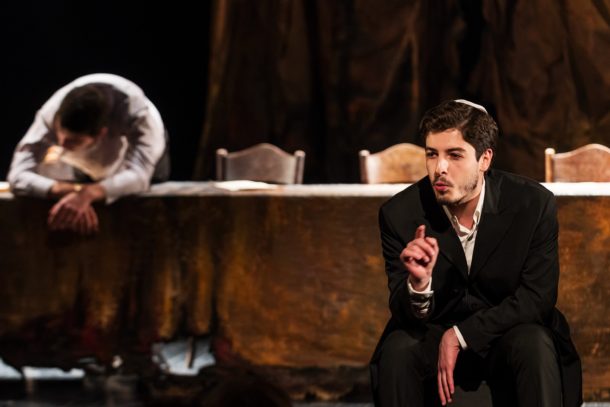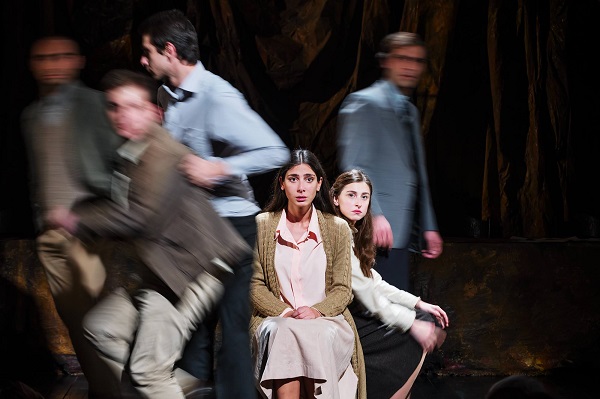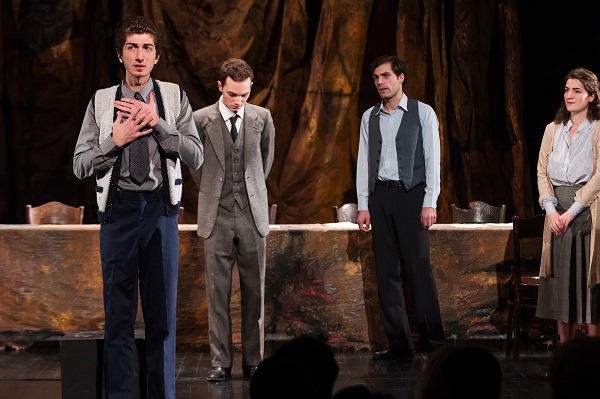Tbilisi, the capital of Georgia. A concentration of all imaginable issues burdening the conflicted Georgians. Emerging from all parts of the country, the problems eventually travel all the way to Rustaveli Avenue – the public space in front of the House of Parliament. Here, as a punctured balloon yields its pressure through a vent, protest finds its outlet. People rally against their government. No Room for Compromise.
Just a half a mile away from these protesters, there is another less noticeable focal point. The Royal District Theater, usually playing to full houses. What’s going on – politics shifting to another platform?!
A controversial Polish piece has caught the attention of hundreds and eventually thousands of people in the Georgian capital city.

Tadeusz Slobodzianek’s Nasza Klasa, directed by Temur Chkheidze. Photo: courtesy The Royal District Theater.
A Friday night theatre getaway unexpectedly turned into a strong emotional experience for my wife and me. It took us by surprise, as it apparently did almost everyone at Royal District Theatre in Tbilisi.
We should not have been surprised, since Nasza Klasa (Our Class), about a small class of Polish and Jewish students before, during, and after WWII, is a play by the great modern Polish dramatist Tadeusz Slobodzianek, staged by the Georgian great master, Temur Chkheidze.
It is hard to put into words how we felt. The incessant anxiety for over three hours of the performance was not eased by a quarter of an hour intermission.
Maybe the source of the play’s power was the story itself? The most horrible events are told in a mechanical, impersonal manner, dry as a news account: Four people died in an accident on the A12 highway near X Town…
Or… At least 340 people of Jewish descent, men, women and children, were locked inside a barn and burnt alive…

Tadeusz Slobodzianek’s Nasza Klasa, directed by Temur Chkheidze. Photo: courtesy The Royal District Theater.
The narratives, mostly monologues, are pronounced in an unemotional somnambular tone, like the weird conversations that we sometimes experience in our dreams. The colors are melancholic and gloomy. Nothing stands out against their sameness. There are no bright lights. The characters (their dress and make-up) all look the same throughout the whole performance, though the timespan of the events described totals over 80 years. The mood is set by iconic songs of 1930s-50s. There is discernibly less ethnic, Jewish or Polish paraphernalia in Temur Chkheidze’s adaptation compared to the English version, which presumably is closer to the Polish original. This makes the actors’ performances seem even more stenographical, accentuating the menacing overtones. The students of Temur Chkheidze’s studio perform in the play. They are young, ambitious and talented, free of burdening experience, and naturally prone to intuitive nuances.
The Georgian director follows Slobodzianek’s concept: brutalities are implicated by gestures, or relayed in the characters’ accounts of events. The effect nevertheless is so captivating that it blows away all reasoning from the spectators, leaving only basic reactions or reflections.

Tadeusz Slobodzianek’s Nasza Klasa, directed by Temur Chkheidze. Photo: courtesy The Royal District Theater.
There is a whole hierarchy of injustice. Murderers, rapists, torturers mingle in the basement, willingly or unwillingly forced down from their normal human condition and caught up by their degraded underworld habitat.
A level above, hovering over individual wrongdoers, there is a collective culprit, the hateful Crowd, abetting these brutalities. It is an obscure multitude with hardly an identifiable human face, rather a Lernaean Hydra with countless humans’ heads held in captivity.
The overarching pinnacle of this construction is the Political Regime legalizing killings; whether it’s the Nazis’ “Judeocidal permissiveness,” or the Soviets’ intolerance towards the “class enemies,” it gives the villains a free hand.
Who is guiltier? Those at the bottom? In strictly legal terms, their criminal intents are established, just as there is no doubt about the maleficent schemes of those at the top of the pyramid. However, the creepiest member of the wicked triad is the Crowd, which has no visible intention. Its latent animosity, sporadically spiking up to a massacre or dropping down to a speechless misanthropy, is reminiscent of prehistoric chaos, or blockhead idols appeased with blood in humankind’s pagan past. Restrained by millennia of civilization, it is still occasionally (or purposefully) invoked from the dark.
Once the door to Hell is open, the play’s little world descends to the basest human motives. There is horror, guilt and desperateness in the uniform drabness of the underworld, a forlorn equality between the villains and their victims, both sinking in their hopelessness. Their expectations never come to fruition; endeavors die away. Rachelka is marrying her classmate Wladek in order to survive. He saved her, but she doesn’t love him. Her whole family is murdered, but she demonstrates classical resilience reminiscent of her ancestors’ perseverance. She converts to Catholicism, learns catechesis, and changes her name, driven by the single purpose of giving birth to her offspring: “We Jews have gone through worse plights. Now the children are the most important.” Yet her beautiful, healthy baby girl dies in the middle of nowhere just a few hours after birth, and she never has children after this, living all her long life in constant fear, never revealing her Jewish origin. Menachem, who retaliates against his inglorious classmates after years of hiding, becomes obsessed with vindictiveness and finally kills himself after his family is blown up in a school bus by terrorists. Wladek, driven by his love for Rachelka, saves her by killing their degraded classmate, then defiantly marries her. After living a long joyless life with Rachelka, he drinks himself to death.
There is almost no Love here, but there are a few sparkles in the total darkness. Rare and odd-looking, they make a dissonance with the surrounding hostility: kids loving their deviant fathers, secret admirers raping and killing their loved ones – all end tragically. There is, however, one imperceptible theme, which may pass by unnoticed. Dora, who has been raped by Rysiek, her classmate, and later burned alive with her baby, is never tainted with hate no matter what is happening to her. After her death, she stays on the stage together with other deceased, silently reacting to the live characters’ actions or occasionally dropping a comment unheard by the latter. There is no hatred or fear in the Dead. Their emotions are subdued. When Rysiek is killed, Dora welcomes her murderer into afterlife. They both look childish and innocent, as in the beginning of the play. Is this the author’s irony? The infernal reality of the play makes one doubtful of any redemption and forgiveness.
Taking the lives of neighbors has suicidal consequences: life is stolen from the small community; lifeless houses whose former owners are killed; a sugar basin and pliers, both of pure silver, an embroidered tablecloth with napkins stolen from the dead – all look like grave goods buried with their deceased masters. Usual events of normal life, a wedding or baptism, turn bizarre. Religion is hypocritical and cynical, reflected in an unwitting phrase spoken to Rachelka – “You are a Catholic now, so you can eat pork.” The various bits of conditionality of human life are becoming dysfunctional and even senseless.
Are we witnessing the fall of the human edifice, the central pillars shattering and the superstructure coming down, Adam reverting back to the “dust of the earth”?
The protest building up against inhumanity finally releases in a question: Could we have averted it? Could the Holocaust have been avoided?

Tadeusz Slobodzianek’s Nasza Klasa, directed by Temur Chkheidze. Photo: courtesy The Royal District Theater.
There is a subtler storyline suggestive of some alternative development: Abram Piekarz, who remains in naïve ignorance throughout the1930s. After immigrating to America, he willingly corresponds with his former pals, though his innocent attitudes contrast with the serpentine shrewdness of the latter. He is manipulated by his so-called friends, who task him with the collection of donations for building a memorial to the “Victims of the Nazis,” which he diligently executes, not suspecting who the real murderers are. Abram is honest and trusting, unlike his astute classmates who consider honesty a weakness. He believes in justice and laws, while they recognize only rule of force. Abram eventually learns who the real perpetrators are and lodges a complaint, a weapon of the civilized world, which however looks ridiculously inefficient against the adepts of force.
Maybe his retreat is a solution? Believing this would mean that what has happened stays local, confined to that very spot and time, affecting only the victims and not all of us who didn’t see it with our own eyes.
We are left with no answers. Only pain.
The characters’ sufferings, blood and tears pierce the dense human crust, leaving small holes through which we glimpse another reality.
The more knowledge, the more grief.
Mikheil Nishnianidze received his Master’s Degree in English Studies from the Tbilisi State Pedagogical Institute of Foreign Languages. He is a Conference interpreter of Georgian, English, and Russian, associated with the International Research Center for Traditional Polyphony and the Tibilisi School of Political Studies. He is Vice-president of the Georgian Translators’ and Interpreters Association, affiliated with the Fédération Internationale des Traducteurs (FIT) and a columnist for the newspapers: “Education” Daily and Colchian Diadem. (1988-1993). His
Translations include Richard Pipes’ “Property and Freedom,” Alfred Alvarez’ “The New Poetry,” short stories by D. H. Lawrence, and R. Steiner’s “Christianity as a Mystical Phenomenon” and “Theosophy.”

European Stages, vol. 14, no. 1 (Fall 2019)
Editorial Board:
Marvin Carlson, Senior Editor, Founder
Krystyna Illakowicz, Co-Editor
Dominika Laster, Co-Editor
Kalina Stefanova, Co-Editor
Editorial Staff:
Stephen Cedars, Assistant Managing Editor
Dohyun Gracia Shin, Assistant Managing Editor
Advisory Board:
Joshua Abrams
Christopher Balme
Maria Delgado
Allen Kuharsky
Bryce Lease
Jennifer Parker-Starbuck
Magda Romańska
Laurence Senelick
Daniele Vianello
Phyllis Zatlin
Table of Contents:
- The 73rd Avignon Festival, July 4-23, 2019 : Odysseys, past, present and future by Philippa Wehle.
- Ibsen in London by Marvin Carlson.
- Report from London (November – December, 2018) by Dan Venning.
- It’s All in the Wrist: How Nina Conti Faces Off with Reality by Katy Houska.
- Staging Trauma: A Review of Bryony Kimmings’s I’m a Phoenix, Bitch by Rachel Anderson-Rabern.
- Difficult Pasts and Revivals: Madrid Theatre Summer 2019 by Maria M. Delgado.
- Cultural Diversity in the Kunstenfestivaldesarts (Brussels) 2019 by Manuel García Martínez.
- Tampere Theatre Festival: Progressing Society by Pirkko Koski.
- Nasza Klasa in Georgia by Mikheil Nishnianidze.
- Young and Critical Voices of Turkey I: “Theatre helps us to hear each other.” A Conversation with Irem Aydın by Eylem Ejder.
www.EuropeanStages.org
europeanstages@gc.cuny.edu
Martin E. Segal Theatre Center:
Frank Hentschker, Executive Director
Marvin Carlson, Director of Publications
©2019 by Martin E. Segal Theatre Center
The Graduate Center CUNY Graduate Center
365 Fifth Avenue
New York NY 10016
European Stages is a publication of the Martin E. Segal Theatre Center ©2019
Martin E. Segal Theatre Center:
Frank Hentschker, Executive Director
Marvin Carlson, Director of Publications
©2019 by Martin E. Segal Theatre Center
The Graduate Center CUNY Graduate Center
365 Fifth Avenue
New York NY 10016
European Stages is a publication of the Martin E. Segal Theatre Center ©2019



